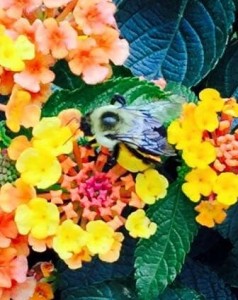Social Media Hashtags: #DailyLines, #GoTELLTheBEESThatIAmGONE, #Book9, #NOitsnotfinishedyet, #Illtellyouwhenitis
[Excerpt from GO TELL THE BEES THAT I AM GONE Copyright © 2020 by Diana Gabaldon.]
 It was a big house. And seemed even bigger with only two people and a dog in it.
It was a big house. And seemed even bigger with only two people and a dog in it.
Fanny, deprived of companionship, clung to me like a small cocklebur, her footsteps echoing behind me—and the tic-tic-tic of Bluebell’s behind hers—as I went to and fro from surgery to kitchen to parlor and back to surgery, the three of us always conscious of the vacant bedrooms overhead and the distant, shadowy, empty third floor high above, its walls a ghostly forest of studs, its glassless windows still covered by laths to keep out rain and snow until the vanished Master should return to finish the jobs he’d left undone.
I’d invited her to share my bedroom, and we’d hauled in the truckle bed from the children’s room. It was a comfort to hear each other’s breathing in the night, something warm and quick, almost drowning out the slow, chilled breathing of the house around us—almost imperceptible, but definitely there. Especially at dusk, when the shadows began to rise up the walls like a silent tide, spilling darkness into the room.
Now and then I’d wake at dawn to find Fanny in my bed, curled against me for warmth and sound asleep, Bluey lying in a nest of quilts at our feet. The dog would look up when I woke, gently thwapping her feathery tail against the bedding, but she wouldn’t move until Fanny did.
“They’ll come back,” I assured her, every day. “All of them. We just have to stay busy until they do.”
But Fanny had never lived alone a day in her life. She didn’t know how to deal with solitude, let alone a solitude filled with the menace of one’s own thoughts.
“What if—?” was the constant refrain of her thoughts. The fact that it was also the refrain—if a silent one—of mine didn’t help.
“Do you think houses are alive?” Fanny blurted one day.
“Yes, I”m sure of it,” I said rather absently.
“You are?” Fanny’s round eyes jarred me back into the present. We were darning socks in front of the fire, having finished the morning chores and eaten lunch. We”d fed the pigs, forked dry hay for the other stock, and milked the cow and two goats—I’d have to churn butter tomorrow, leave aside a couple of buckets for cheese-making, and send the rest of the extra milk downhill to Bobby Higgins
“Well… yes,” I said slowly. “I think any place that people live for a long time probably absorbs a bit of them. Certainly houses affect the people who live in them—why shouldn’t it work both ways?”
“Both ways?” She looked dubious. “You mean that I left part of me at the brothel—and I brought part of the brothel with me?”
“Didn’t you?” I asked gently. Her face went blank for a moment, but then the life returned to her eyes.
“Yes,” she said, but she was wary now, and added nothing more.
Return to my official webpage for GO TELL THE BEES THAT I AM GONE for links to information and more Daily Lines (excerpts).
Many thanks to Kirsty Scaife for the lovely bee photo!
You may share the link to this excerpt, but please do not copy and paste the text in whole or in part and post it elsewhere. Thank you.
-Diana
This excerpt (“Daily Lines”) was also posted on my official Facebook page on Tuesday, September 29, 2020.
This excerpt webpage was last updated on Friday, October 18, 2020, at 1:45 a.m. Central Time by Diana Herself or Diana’s Webmistress.